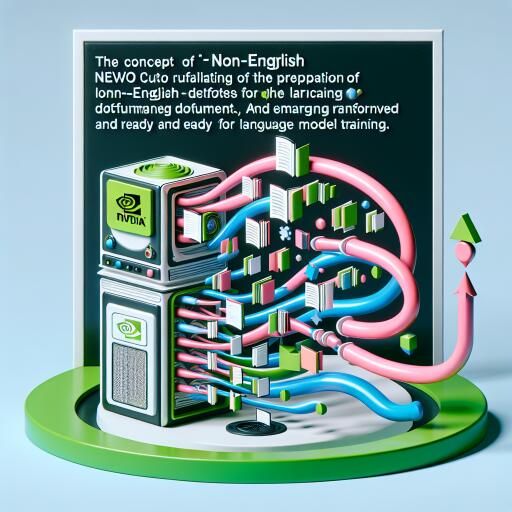NVIDIA NeMo Curator Boosts Dataset Preparation for Non-English LLM Training
Training large language models (LLMs) accurately and effectively demands high-quality, diverse datasets. Recognizing this need, NVIDIA has introduced the NeMo Curator, an innovative open-source data curation library designed to streamline the preparation of superior non-English datasets. This leap forward promises to enhance LLM training, focusing on model accuracy and reliability, particularly for under-represented languages.
At the heart of developing effective and fair LLMs lies the critical task of data curation. The quality of training data influences the model’s performance, addressing potential biases, inconsistencies, and redundancies. NVIDIA’s NeMo Curator emerges as a vital tool in this endeavor, offering scalable and efficient solutions for dataset preparation, which in turn, aids in the scalable training of localized multilingual LLMs.
For languages with limited resources, data often stems from web crawls, carrying the weight of noise, irrelevant content, duplicates, and formatting challenges. NVIDIA’s NeMo Curator addresses these hurdles head-on, deploying a customizable and modular interface that eases the process of dataset preparation. By ensuring the creation of high-quality tokens, the tool accelerates model convergence, ultimately enhancing LLM performance.
[INSERT_IDENTITY]Powered by GPU-acceleration utilizing Dask and RAPIDS, the NeMo Curator enables the mining of high-quality text from vast uncurated web corpora and custom datasets. This approach is crucial for handling extensive data efficiently and is exemplified through a workflow using the Thai Wikipedia dataset. Considering Wikipedia’s precise and structured content, it serves as an excellent basis for LLM pretraining, benefiting greatly from NeMo Curator’s ability to sift through and keep only the most suitable data for training purposes.
The process of curating the Thai Wikipedia dataset illustratively shows the steps involved – from filtering low-quality documents to applying advanced data curation techniques like deduplication and heuristic filtering. Specifically, the NeMo Curator’s ExactDuplicates and FuzzyDuplicates classes utilize GPU-accelerated technologies and algorithms such as MinhashLSH to efficiently remove duplicate content, thereby enhancing the dataset’s quality.
Moreover, the NeMo Curator incorporates heuristic filtering to exclude low-quality content employing simple, computationally light rules. With a diverse range of heuristics available for natural and coding languages, this method streamlines the preparation of training data, ensuring models are trained on accurate and relevant information.
For those interested in implementing the NeMo Curator in their data curation workflow, NVIDIA provides a comprehensive tutorial, accessible through its GitHub repository. The guide offers insights into setting up GPU-accelerated deduplication, installing the NeMo Curator library, and navigating the data curation process for the first time.
Enterprises looking to leverage NVIDIA’s NeMo Curator for enhancing their data curation efforts can also request access to a microservice version. This service further simplifies the process, providing a streamlined and efficient performance.
As the demand for localized and efficient LLMs grows, tools like NVIDIA’s NeMo Curator play a pivotal role in meeting the industry’s evolving needs. By facilitating the preparation of high-quality, non-English datasets, NVIDIA not only advances the capabilities of LLM training but also underscores its commitment to fostering innovation and equity in the field of artificial intelligence.









